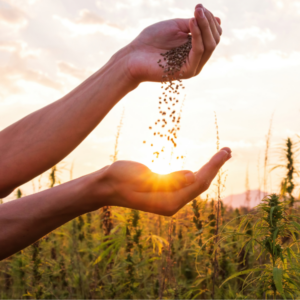THC vs. CBD: Everything You Need To Know
The Difference between THC and CBD? The debate around cannabis products concerning their use and legality usually centers around the chemical compounds found in the plant, referred to as cannabinoids.
This article is going to familiarize you with the two most widely-discussed cannabinoids: tetrahydrocannabinol (THC) and cannabidiol (CBD) in addition to giving you a comprehensive rundown of the differences in their structure, uses, side-effects and risks.
Contents
THC vs. CBD: Properties & Chemical Structure
THC vs. CBD: Psychoactive Effects
THC vs. CBD: Side Effects & Risks
What are Cannabinoids?
Cannabinoids are the chemical compounds found in the cannabis plant. There are at least 113 different cannabinoids isolated from cannabis, and all of them exhibit varied effects.
Cannabinoids are concentrated in a thick, viscous resin produced by the cannabis plant and organized in structures known as glandular trichomes. Of the 113 cannabinoids isolated from the cannabis plant, the most studied include tetrahydrocannabinol (THC) and cannabidiol (CBD).

THC is considered to be the primary psychoactive compound in cannabis while CBD is widely studied for its therapeutic uses.
THC vs. CBD: Properties & Chemical Structure
CBD and THC have the same molecular structure composed of 21 carbon atoms, 30 hydrogen atoms and 2 oxygen atoms with a slight difference in how the atoms are arranged. This difference accounts for the varied effect each has on the body, similar to a set of instructions.
Since CBD and THC are chemically similar to the body’s endocannabinoids (cannabinoids produced naturally), they interact with the body in similar ways. A useful example is the feeling of happiness. It can be achieved from thinking about puppies (if you like puppies, that is) or through drinking a few alcoholic drinks. The difference is that one is exogenous (the beer), while the other is endogenous (the feelings produced from happy thoughts).
Activity associated with cannabinoids occurs within the endocannabinoid system, which is thought of as one of the many networks within the greater nervous system of the body.
The endocannabinoid system is considered to be widely involved in the regulation of many physiological and cognitive processes. While still under extensive research, studies have demonstrated that cannabinoids work in the endocannabinoid system to produce effects associated with pain relief, increased wellbeing and reduced inflammation.
THC vs. CBD: Psychoactive Effects
Despite their similar chemical structure, CBD is considered to be a nonpsychoactive compound when compared to THC. This is due to the idea that THC binds to different receptors in the brain to produce feelings of euphoria.
In contrast, CBD binds weakly with those specific receptors, if at all. Some researchers believe that CBD may even interfere with the binding of THC, leading to a reduced effect of THC overall.
THC vs. CBD: Uses & Benefits
Cannabis has been studied extensively for use in treating medical conditions associated with pain. The effect of external cannabinoids like CBD and THC mimic the internal pain-relieving cannabinoids produced naturally, and are therefore considered to be effective and having many benefits in treating a variety of conditions.

The difference lies in the psychoactive nature of THC and the effect it has on different receptors located in the brain and spinal cord. This contrasts with CBD’s effects on receptors located throughout the body. While the conditions they both address are similar, patients opting for a non-psychoactive treatment opt for CBD-based products with little to no THC.
Since CBD is legal in most countries, it has been extensively studied and shown to be effective for the following conditions:
- Strong anti-inflammatory effects – Many diseases result in inflammation that can cause pain. CBD has been shown to be effective in treating pain symptoms for many conditions where inflammation is present;
- Anxiety – Studies have shown that CBD can help address stress-based anxiety through its work on receptors in the brain, with additional benefits that include reduced muscle tension, enhanced sleep and increased feelings of relaxation;
- Epilepsy – Recent clinical research has shown that CBD can reduce seizures with the most well-known case being that of Charlotte Figi, a young girl suffering from hundreds of weekly seizures that were reduced to one or two per month following the use of CBD;
- Pain Management – CBD has been studied widely for pain and shown to be effective for pain management for a variety of conditions through its demonstrated action on the endocannabinoid system, making it a safe and effective alternative to chemical alternatives for pain management;
- Multiple sclerosis (MS) – Studies have demonstrated that CBD is an effective way to relieve pain and increase mobility in MS patients.
THC vs. CBD: Side Effects & Risks
Research studies on CBD in human populations have demonstrated that it is extremely well-tolerated and safe to use with very few adverse reactions. Any side effects observed have been mild, and include:
- Diarrhea
- Appetite/Weight Changes
- Fatigue
It should be noted that some articles on the internet concerning CBD have referenced a study that claims that it can cause liver toxicity. With regard to this claim, it should be noted that the research was done on mice that were force-fed extremely large doses.
THC, due to its psychoactive properties, has been shown to have side effects due to its effect on the brain and cognition in some individuals.

THC triggers the brain to release large amounts of dopamine which produces “feel good” sensations. For some, this may impair judgment and decision making, in addition to altering the structure of the brain.
It should be noted, however, that some strains of marijuana have been genetically altered through selective breeding to produce more THC when compared to CBD. The side effects of natural strains, also referred to as “hippie weed”, are far fewer when compared to modern varieties.
THC vs. CBD: The Bottom Line
THC and CBD are among the 113 cannabinoids found in the cannabis plant. Though structurally similar, they have varied effects on the body due to slight differences in their chemical structure.
THC has psychoactive effects due to its action on receptors in the brain and spinal cord while CBD works more on receptors in the body. While both have their therapeutic uses, CBD is the only compound between the two that is legal, making it widely available in many countries.





